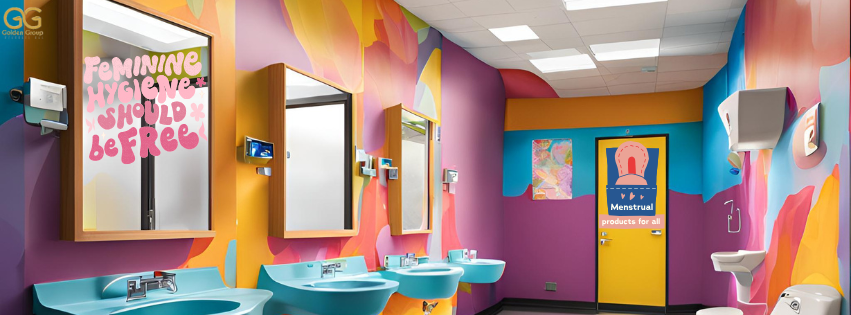
Access to menstrual products is a fundamental necessity for people who menstruate. Despite this, many individuals face barriers to accessing these essential items, leading to physical discomfort, emotional distress, and disruptions in their daily lives. Public facilities, such as schools, workplaces, libraries, and transit hubs, are pivotal spaces where providing free menstrual products can have a transformative impact. Offering these items through menstrual dispensers or menstrual product vending solutions not only supports menstrual equity but also promotes dignity, health, and inclusivity.
Breaking the Stigma Around Menstruation
Menstruation is a natural biological process, yet it remains shrouded in stigma and misinformation. This societal taboo often discourages open conversations about menstrual health and the challenges faced by those who menstruate. Providing free menstrual products in public facilities through menstrual product dispensers sends a powerful message that menstruation is normal and should be accommodated without shame or secrecy. It also fosters a culture of acceptance and understanding, encouraging individuals to talk more openly about menstrual health and its implications.
Addressing Period Poverty
Period poverty—the lack of access to affordable menstrual products—is a pervasive issue worldwide. It affects individuals from all walks of life, particularly those from low-income households. The inability to afford sanitary products can lead to missed school days, lost work opportunities, and compromised health due to the use of unsafe alternatives. By offering free menstrual products in public facilities through menstrual product vending solutions, we can help alleviate this burden and ensure that no one has to choose between managing their period and participating in daily activities.
Impact on Education
Students, especially young girls, are disproportionately affected by period poverty. A lack of access to menstrual products can result in missed classes, decreased academic performance, and even school dropouts. When schools provide free sanitary items through menstrual dispensers, they empower students to focus on their education without the added stress of managing their periods. It also fosters gender equity in education, ensuring that menstruation does not become a barrier to learning.
Promoting Health and Hygiene
Using inadequate or unsafe substitutes for menstrual products—such as tissue paper, socks, or newspapers—can lead to severe health issues, including infections and irritation. Public facilities equipped with free menstrual products encourage the use of safe, hygienic items, reducing the risk of health complications. Additionally, these facilities often include proper disposal units, ensuring a clean and sanitary environment for all users.
Encouraging Proper Disposal Practices
Providing menstrual products through menstrual product dispensers goes hand in hand with ensuring adequate disposal solutions. Sanitary napkin disposal units prevent waste from clogging toilets and maintain restroom cleanliness. Facilities that prioritize both access to products and proper disposal demonstrate a commitment to comprehensive menstrual hygiene management.
Enhancing Workplace Wellness
Workplaces that provide free menstrual products signal to employees that their health and well-being are valued. This small yet significant gesture can improve employee satisfaction, reduce absenteeism, and boost productivity. Menstrual product dispensers in workplace restrooms help ensure that employees have easy access to the products they need, fostering an inclusive and supportive work environment.
Cost and Feasibility
A common argument against providing free menstrual products is the associated cost. However, the investment is relatively modest compared to the benefits it delivers. Many public facilities already supply free toilet paper, soap, and hand towels, recognizing them as essential hygiene products. Menstrual products are no different; they should be considered a basic necessity rather than a luxury.
Governments and organizations can explore cost-effective solutions such as partnering with manufacturers or leveraging bulk purchasing agreements. Additionally, the long-term benefits of increased productivity, reduced absenteeism, and improved public health far outweigh the initial expenses.
Legislative Support for Menstrual Equity
Across the globe, governments are recognizing the importance of menstrual equity. Countries like Scotland have led the way by legislating free access to menstrual products in public spaces. In the United States, states such as California and New York have passed laws mandating free sanitary products in schools and other public facilities. These policies set an important precedent, demonstrating that menstrual health is a public issue deserving of attention and resources.
Inclusivity in Menstrual Health
It is crucial to recognize that menstruation affects not only women but also transgender men, nonbinary individuals, and others who menstruate. Providing free menstrual products in public facilities ensures inclusivity and acknowledges the diverse needs of all users. Inclusive practices, such as stocking products in all-gender restrooms, further reinforce a commitment to equality and respect for all individuals.
Steps to Implement Free Menstrual Product Programs
1. Assessment of Needs: Conduct surveys and assessments to identify the specific needs of the facility’s users.
2. Selection of Products: Choose a variety of products, including pads and tampons, to cater to different preferences and needs.
3. Strategic Placement: Ensure products are easily accessible, such as in restroom stalls or designated menstrual product dispensers.
4. Awareness Campaigns: Educate users about the availability of products and the importance of proper disposal.
5. Sustainability Practices: Opt for environmentally friendly products and disposal options to minimize waste.
6. Partnerships: Collaborate with manufacturers, non-profits, or community organizations to secure funding and resources.
The Broader Impact of Free Menstrual Products
Providing free menstrual products is not merely about addressing an immediate need; it is a step toward broader societal change. It challenges deep-seated taboos, promotes gender equality, and ensures that everyone can participate fully in education, work, and public life without the barriers imposed by menstruation. Public facilities that take the initiative to provide these products through menstrual product vending solutions are not only addressing a practical necessity but are also fostering a culture of dignity and inclusion.
Conclusion
Menstrual equity is an essential component of a fair and just society. Public facilities have a unique opportunity to lead the charge in normalizing menstruation and addressing the challenges associated with it. By implementing menstrual product dispensers and vending solutions, these spaces can support individuals in leading healthy, productive, and dignified lives. Golden Group International offers a range of innovative menstrual product dispensers and disposal solutions to help facilities take this crucial step toward inclusivity and equity. Visit our website to learn more and partner with us in creating a more equitable future for all.

 Login
Login


